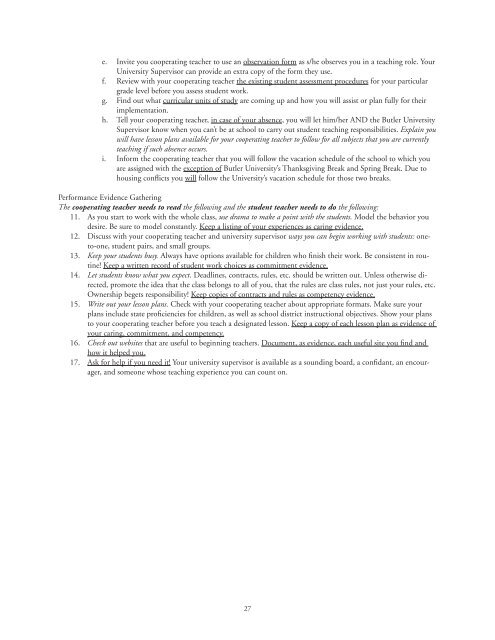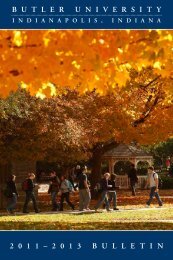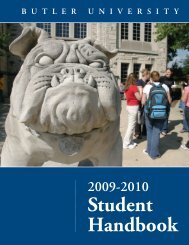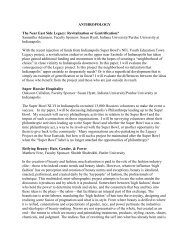Student Teaching Handbook - Butler University
Student Teaching Handbook - Butler University
Student Teaching Handbook - Butler University
Create successful ePaper yourself
Turn your PDF publications into a flip-book with our unique Google optimized e-Paper software.
e. Invite you cooperating teacher to use an observation form as s/he observes you in a teaching role. Your<br />
<strong>University</strong> Supervisor can provide an extra copy of the form they use.<br />
f. Review with your cooperating teacher the existing student assessment procedures for your particular<br />
grade level before you assess student work.<br />
g. Find out what curricular units of study are coming up and how you will assist or plan fully for their<br />
implementation.<br />
h. Tell your cooperating teacher, in case of your absence, you will let him/her AND the <strong>Butler</strong> <strong>University</strong><br />
Supervisor know when you can’t be at school to carry out student teaching responsibilities. Explain you<br />
will have lesson plans available for your cooperating teacher to follow for all subjects that you are currently<br />
teaching if such absence occurs.<br />
i. Inform the cooperating teacher that you will follow the vacation schedule of the school to which you<br />
are assigned with the exception of <strong>Butler</strong> <strong>University</strong>’s Thanksgiving Break and Spring Break. Due to<br />
housing conflicts you will follow the <strong>University</strong>’s vacation schedule for those two breaks.<br />
Performance Evidence Gathering<br />
The cooperating teacher needs to read the following and the student teacher needs to do the following:<br />
11. As you start to work with the whole class, use drama to make a point with the students. Model the behavior you<br />
desire. Be sure to model constantly. Keep a listing of your experiences as caring evidence.<br />
12. Discuss with your cooperating teacher and university supervisor ways you can begin working with students: oneto-one,<br />
student pairs, and small groups.<br />
13. Keep your students busy. Always have options available for children who finish their work. Be consistent in routine!<br />
Keep a written record of student work choices as commitment evidence.<br />
14. Let students know what you expect. Deadlines, contracts, rules, etc. should be written out. Unless otherwise directed,<br />
promote the idea that the class belongs to all of you, that the rules are class rules, not just your rules, etc.<br />
Ownership begets responsibility! Keep copies of contracts and rules as competency evidence.<br />
15. Write out your lesson plans. Check with your cooperating teacher about appropriate formats. Make sure your<br />
plans include state proficiencies for children, as well as school district instructional objectives. Show your plans<br />
to your cooperating teacher before you teach a designated lesson. Keep a copy of each lesson plan as evidence of<br />
your caring, commitment, and competency.<br />
16. Check out websites that are useful to beginning teachers. Document, as evidence, each useful site you find and<br />
how it helped you.<br />
17. Ask for help if you need it! Your university supervisor is available as a sounding board, a confidant, an encourager,<br />
and someone whose teaching experience you can count on.<br />
27

















